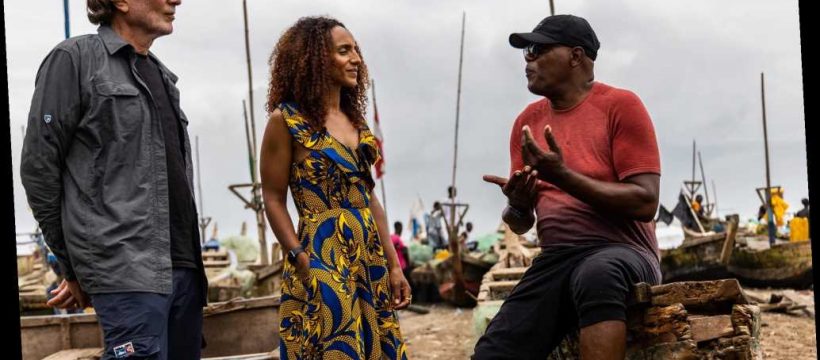A new Epix docuseries casts the history of the transatlantic slave trade in a new light.
“Enslaved” follows star Samuel L. Jackson as he traces his roots with help from British author/broadcaster Afua Hirsch and investigative journalist Simcha Jacobovici. The series airs Mondays at 10 p.m.
“It was very unique to travel with [Jackson], because you go to a fishing community in rural Ghana and everybody in the market knows who he is,” Hirsch, 39, tells The Post. “There is no going incognito anywhere with him. He brought his life experience to everything that we saw and discussed.
“So that really elevated a lot of the conversations that we were having.”
Each of the series’ six episodes features segments following Jackson on his journey to find his ancestors’ stories, with Hirsch and Jacobovici putting his discoveries into context.
“I have been working on the history of the transatlantic slave trade — race, diaspora and the global black experience — for a long time,” says Hirsch. “The scope [of ‘Enslaved’] is to really join the dots between the UK and other European nations like Portugal and the African continent and to then go to North America and understand the history of the African-American experience. Also South America, Brazil, the Carribean…you can’t really understand [this history] until you achieve that broad vision of the big picture.
“This was a unique opportunity to have the space to do that.”
Over the course of her career, Hirsch has worked in a variety of fields, including law and journalism. She’s been the West Africa correspondent for The Guardian and an editor at Sky News and wrote the 2018 book, “Brit(ish): On Race, Identity and Belonging.”
In addition to “Enslaved,” she’s appeared on several other docuseries, including BBC’s “African Renaissance: When Art Meets Power” and the “The Battle for Britain’s Heroes” on Channel 4 in the UK.
“I think each story has its own demand in terms of the best way to tell it,” she says. “I love the written word and I really believe in print journalism. But I do also enjoy TV because I think some stories really lend themselves to visual storytelling. This is an example of that, because for many of us, the only thing that we see when it comes to the transatlantic slave trade are drawings of slave ships…maybe manacles and shackles, but there is very little physical evidence to see and engage with.
“We’ve really been able to find things that make this a tangible story.”
Hirsch says it was particularly moving to visit Elmina castle in Ghana with Jackson, since they both have ancestry there.
“Elmina is one of the major slave forts; the last place that millions of Africans on the African continent would have been before being trafficked to this life in the Americas,” she says. “That’s a place of huge emotion for [Jackson], because his ancestors may have been among those trafficked through that fort. And it was a place of huge emotional significance for me, because my ancestors came from that area. It was a really intense journey to go on.”
But while the subject matter of “Enslaved” is tragic and harrowing, Hirsch says she also finds it inspiring.
“We’ve all been born into a world which was shaped by slavery in so many ways — and that’s not just people of African heritage,” she says. “The language we use, the socioeconomic patterns in our societies, the demographics, the culture, the music, the clothes. Globally, we all consume culture which directly stems from that history.
“It is traumatic to really dwell on what happened,” she says. “However, I think one thing that is not told enough is the extent to which the story of the slave trade is the story of remarkable human resilience. For me it was personally very uplifting to play a part in telling those stories of courage and the agency of black people that is too often downplayed.”
Share this article:
Source: Read Full Article

